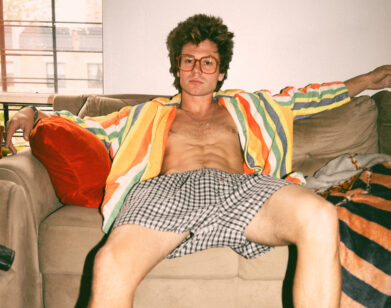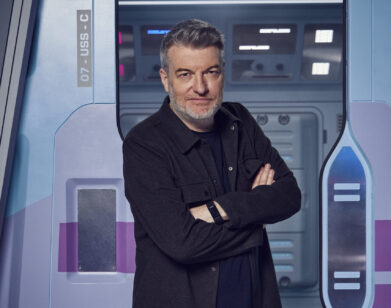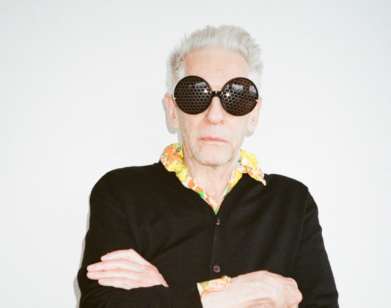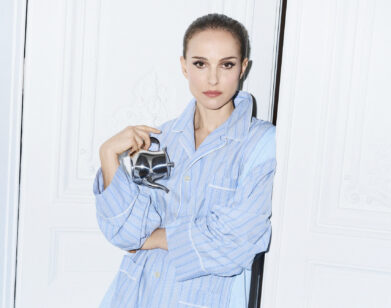in conversation
Sunita Mani and Reggie Watts on Beating Back Imposter Syndrome
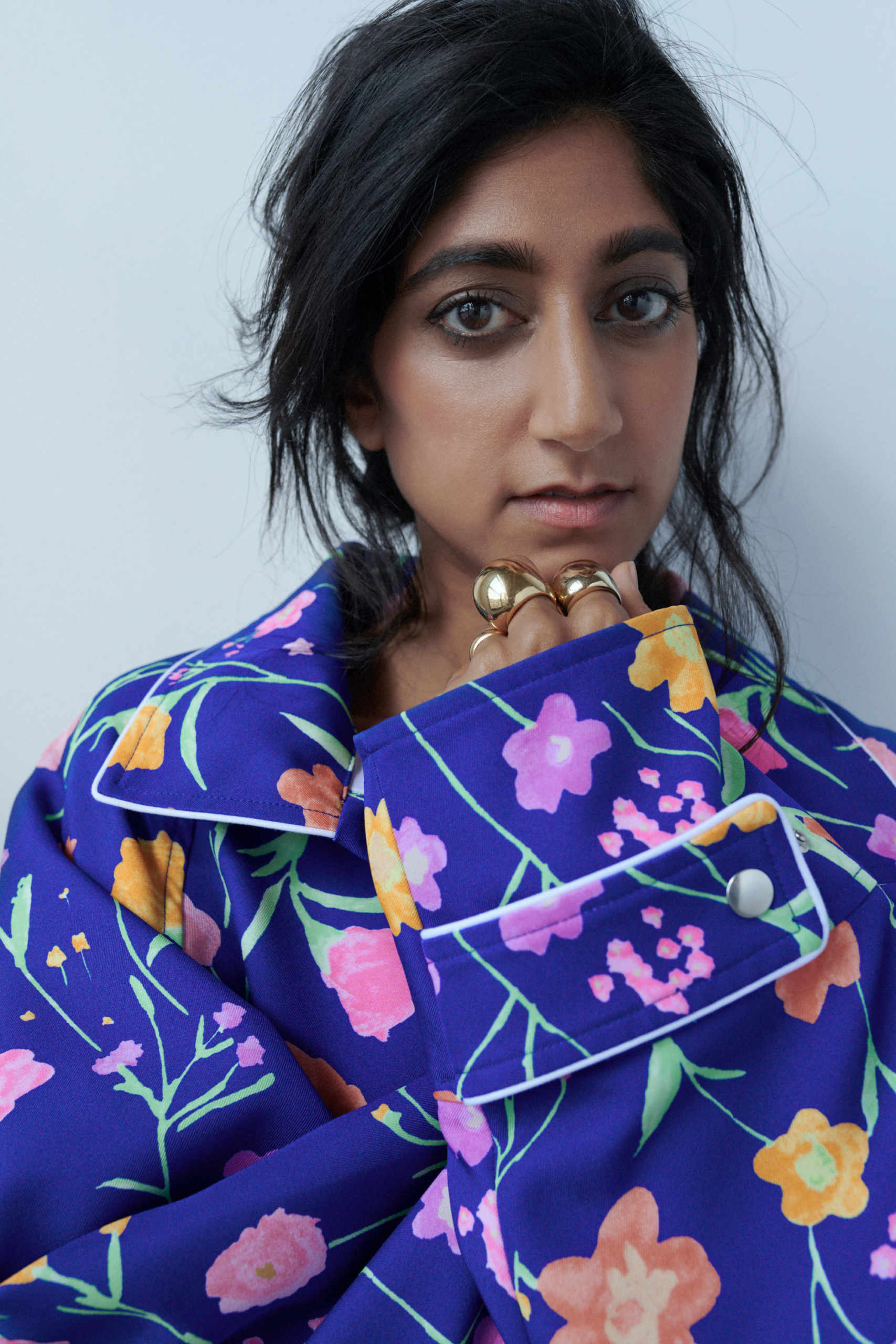
For Sunita Mani, 2020 has been a year of professional peaks and valleys. At the same time that she was headlining movies for the first time in her career, GLOW, the beloved Netflix comedy she starred in for three seasons, was unceremoniously canceled by the streaming giant. The move, which Netflix blamed on the pandemic, not only blindsided the show’s devoted fanbase, but also its cast, who had already begun filming the fourth season. Soon after the cancellation was announced, Mani posted a letter to her Instagram account that she and five other castmates—all women of color—sent to the show’s producers during its pandemic-related hiatus, lamenting the show’s failures to live up to the standards of diversity and inclusion it first set with such a multicultural ensemble. “GLOW has been marketed as a diverse ensemble, but for all of us diverse cast members, it has never lived up to these ideals,” Mani said on Instagram. “Since Season 1, the show has planted racial stereotyping into our character’s existence, yet your storylines are relegated to the sidelines in dealing with this conflict or have left us feeling like checked-boxes on a list.” Mani said the letter was positively received, and suggested that those issues were going to be addressed in the new season, which made the show’s cancelation even more difficult to absorb.
None of this is new for the 33-year-old Tennessee native. Mani has spent nearly a decade navigating the capricious world of show business, first as a stand-up comedian, and then as a member of the Cocoon Central Dance Team, a three-person act which combines comedy and movement. As a performer of South Asian descent, she has had to question whether or not she belongs because of her talent, or because the project needed someone of her ethnicity. This year, she’s made her own case with a pair of performances that highlight her range. In the contemporary indie comedy Save Yourselves!, she played one half of a couple who has to deal with an alien invasion while disconnecting in upstate New York. Then, she swerved into dark fare with the thriller Evil Eye, part of an anthology that Blumhouse released on Amazon Prime last fall. Mani, who was recently cast opposite Oscar Isaac and Jessica Chastain in the HBO limited series Scenes From a Marriage, recently connected with the comedian and musician Reggie Watts to discuss her early days in the showbiz trenches, battling imposter syndrome, and learning to be enough.
———
SUNITA MANI: Well, hi.
WATTS: Long time no see.
MANI: How are you?
WATTS: Me good.
MANI: I’m wearing my mask right now. I’m on a little walk. I’ve been laying flat on my back a lot so I decided to get up and put these things in motion. I’m actually a little sore. I was in a little bit of dance rehearsal.
WATTS: With the Cocoon Central Dance Team?
MANI: Yeah. We all got tested and made a video together for a project. It was really wild to be in the same place at the same time, together. It was a celebration.
WATTS: Wowzers. I love that you guys are attacking. That’s how I came to know you, you know?
MANI: Yeah. It’s pretty wild.
WATTS: That’s something that I wanted to talk about. Take me through your trajectory when you moved to New York. Why did you want to move?
MANI: I ended up in New York by way of Boston. I was at Emerson College and always wanted to live in New York, but I just went to Boston instead. I think I was too nervous. I didn’t really know what I was doing in college, but I got so wrapped up in the comedy scene, because it looked so fun, and it was. I had that dream for myself. Perform with my friends, put on our shows. But we had to also feed ourselves, and pay rent, and have jobs, so we grew up. Cocoon was born out of that misery of that growing pain. It’s like, “Oh, shit. Adulthood.” We would host shows at our house. We had no furniture. We had an exposed brick wall. We thought that was really cool for a backdrop of a show. So we taped a mic handle to a broom handle, and would host these shows. Basically they were just parties, but we took them a little bit seriously, and performed an opening number for them. That was the first of Cocoon Central Dance Team. Then I feel like I met you in New York at shows. It’s so amazing to be billed on these variety shows, alongside you and people who are doing this. That’s where I knew I belonged.
WATTS: With Cocoon, you approach things like you’re taking an art form, or medium, that isn’t necessarily immediately associated with comedy per se, and you’re making it into a comedic element. Or, even better than that, I would say an absurdist element. Cocoon could go in a few different places, right? You guys could be at an experimental film festival or an actual dance event, but then you also can be on a tiny stage doing your stuff. So it’s super flexible, but when you bring it into the comedy thing, there’s so much horsepower there. All three of you are so crazy charismatic.
MANI: Did you feel like, when you were in a music program, that you belonged there? I feel like I could never take myself seriously in education. I always had to be a clown.
WATTS: 100 percent. That was my problem. I studied piano starting at age five. Once I discovered Monty Python, I just started seeing everything as ridiculous, absurd, and funny. So when I would have my assignments to do a piano piece, I would start with the piece, but then I would improvise and roll in with some other stuff. I learned music theory up to a point, and then I got disinterested with it and was more interested in doing dumb, silly things. What I get from all of that is that I like to be myself. I could say I’m a comedic performer and an improviser, but I think defining yourself by what you’re not is super crucial in the engine of motivation for yourself and your life course. I definitely see that in you, because of the similarities of having strong ties to another culture. Growing up in the United States as a brown person, and then integrating with all these different systems, and being a smart person, I’m sure you don’t define yourself by your race. You don’t lead by that. At least I never did when I was growing up. I knew I was different compared to the majority. But I didn’t lead that way. I led by my character. I led by my personality and my viewpoint.
MANI: I really avoided defining myself by my ethnicity. I just wanted it removed, almost entirely, because I was so aware of it. I wanted to thwart it, and be like, it doesn’t exist. But now I feel like I’m coming back to a place where there is more integration of my culture and my identity. It’s hard to parse out exactly the mix of what is and what isn’t from my Indian culture. It’s like this new level of awareness that feels a little sticky, but dance comedy and a lot of acting, you don’t have to think too much, hopefully. Especially not with dancing. Just do. I feel like I’m in a sticky phase of my identity right now. And we’re in a sticky place in time.
WATTS: How so?
MANI: We are totally redefining structures. And as you say, it’s so important. I have more language, for instance, of how to talk about my identity, and my experiences, because more people are talking about their experiences in having multicultural backgrounds. It’s helpful. But it is like, there’s more space to exist in, and it’s almost hard for me, because the confines, the things to push against were so defining for me growing up, and now it’s like, “Oh, I have more space. Oh, shit. What do I do? What do I do with this space?”
WATTS: How did you become an actor?
MANI: As a kid, I think I did want to be an actor, but I couldn’t really say it out loud, or I didn’t let myself think that far or dream that big. So it was far away. But I really love it, and I think it’s such a cool job. I think it was a couple seasons into Glow that I was able to say, “I think I’m an actor now.”
WATTS: Do you ever feel like you have imposter syndrome? When you are acting do you ever feel like, “What am I doing?”
MANI: Oh my god. All the time. It’s something I definitely compound with being a woman and part of a diversity quotient. I can really rip the rug out from under myself and be like, “Wow, I’m only here because I’m a brown woman. Otherwise, I wouldn’t have this show.” It’s always there a little bit. I know it’s not healthy, and it’s not always real, but it’s there because it feels like I’m not allowed to be in the room with my Julliard-trained actor friends, because they’re amazing. But at the same time, I am someone who learns on the job. I do feel like I’ve been schooled because I’m watching people like Gayle Rankin and Betty Gilpin and Alison Brie on set. It’s a different type of learning, but I do feel like I’ve gotten opportunities because of the rise of diversity. It’s amazing, and at the same time it’s like, “Wait. Did I earn this? Should I be here?” There’s always something chasing me like, “You’re not enough.”
WATTS: With the diversity hire aspect of it, do you ever think of that as an advantage in this climate?
MANI: I think with Glow, I was so happy it was me because I believed in this role just as much as anyone, if not more than anyone. I’m going to bring my personal experience to this. That’s an advantage. It’s a good thing that I’m here.
WATTS: Aside from your desire to perform, do you ever think about how you might influence someone of color, and also women? Do you view yourself as someone who helps people push themselves into knowing that they can do these types of things?
MANI: I don’t hear from that many people outside of my friend circle, but sometimes I’ll get an email, or a comment, that’s like, “This really helped me.” Or, “I’m so glad I could see this representation.” Sometimes it’s from Indian women and sometimes it’s from anybody. And that’s making more sense to me now, that I can have that impact. I didn’t really feel that until recently. You have albums, and you have recorded documents of things. How do you look back on those? Do you have a different relationship with it as you’re making it?
WATTS: I think of them as snapshots of moments in time. It’s funny, because I thought about the idea of recording all the way back to when I was a kid and had a tape recorder, and I remember hearing my voice back from a recorded medium, and I was so fascinated with that. You’re kind of dividing yourself. You’re able to step out by yourself and go, “Oh, interesting.” Which is just an incredible feeling. That brings me to your film, Evil Eye. When does that emerge, or has it emerged already?
MANI: It was released on Amazon on October 13th. It was part of this series of films that came out. Blumhouse and Amazon partnered up to make an anthology series of horror movies. Four were released this year, and then they’re going to release four more next year. Our movie, Evil Eye, got to be in the first set and it was a thrill. Honestly, it’s not that scary, so if you’re a horror buff, I think you’ll be disappointed.
WATTS: I don’t like horror movies. I find them a little boorish, but I’m glad to hear that it’s not that scary, so now I can watch it. What was that like? That was your first film without it being a thing created by friends?
MANI: Yes, I met a bunch of strangers. I’m super excited by one of the castmates in particular. Sarita Choudhury, who plays my mom in the movie. That was the reason why I did the movie, because I’m not normally up for a horror movie. I was suspicious of the whole thing, but it is an Indian led cast, which is cool. I’m also weirdly suspicious of that, too. I’m like, “Hmm. What is this about?” But I loved being around so many people of south Asian descent. I wasn’t alone. That was really exciting. My character in that movie is slowly dragged into the horror movie. The mom’s character is living the horror movie more so in the plot of the movie, and my character is catching up.
WATTS: Wow. That’s a trip. Okay, I’m looking forward to seeing it now. What do you have coming up in the future?
MANI: This is a wild time, but I’m excited to hold on to a few ideas that I have that I want to write and turn into a TV show or a film, to just have something to work through all this anxiety. It’s nice because I feel like I’m writing a little bit of an escape for myself. I’m still working with Cocoon. We’re also writing and trying to work on the TV project together. And man, I don’t know. Still do this acting thing. Still auditioning, and hopefully cool stuff pans out. But I don’t mind not knowing. Hopefully I can keep my pen to the page. I’m not super inspired right now. I was a few months ago.
WATTS: I really look forward to that. You’re definitely one of my favorite actors now. You’re completely unique, and your expressiveness is huge.
MANI: That’s so kind. I think the world of you, so it’s nice to be on your mind in this way.
WATTS: Well I guess that’s it. We did it. Thanks to Andy Warhol.
MANI: We are Andy Warhol.
WATTS: That’s our conclusion.

